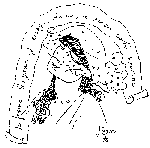|
|
|
" ................... Site Index Synopsis Introduction Index of People Index by Profession Extracts From The Book: Princess Marthe Bibesco Ana Blandiana Smaranda Braescu Madelene “Madi” Cancicov Nina Cassian Elena Ceausescu Ioana Celibidache Queen Elisabeth of Romania Princess Gregoire Ghica Princess Ileana of Romania Dora D’Istria Monica Lovinescu Ileana Malancioiu Queen Marie of Romania Dr. Agnes Kelly Murgoci Mabel Nandris Countess Anna de Noailles Ana Novac Oana Orlea Ana Pauker Marta Petreu Elisabeta Rizea of Nucsoara Sanda Stolojan Leontina Vaduva Anca Visdei Sabina Wurmbrand |
"Blouse Roumaine" - Extracts from the Book .................................................................................................. selected and introduced by Constantin Roman. Countess Anna de Noailles, née Princess Brancovan (3) .................................................................................................. (1876, Paris, France-Paris, France,1933) Writer, Poet  114. Desire: “Pain and death are less involuntary than the choice of desire”. Le Coeur innombrable, I, Le baiser 454. Solitude: “The double solitude, where all the lovers are.” (“Les Vivants et les Morts”) 507. Useless: “I might have been useless, but irreplaceable.” (“Motto”) -------------------------- Biography:  Much lionised by the Parisian salons of the turn of the 20th century, Anna de Noailles is born Princess Brancovan, of a Greek mother Ralouka Musurus, and a Romanian father the Prince Brancovan. Her mother, a well known musician, was idolised by Paderewski. A century on Anna de Noailles is more readily remembered for her part as an enchanting society aristocrat, friend of the literate, than for her poems of a “Parnassian” influence. Her debut as a poet is made in 1899, followed by a first volume of collected poems in 1901, “Le Cœur innombrable” which has a resounding success. She is elected a Fellow of the Académie Royale Belge de Langue et de Littérature Françaises and the exclusive Académie Française awards her the Grand Prix de Littérature. She is the first woman to become a Commander of the Légion d’honneur. Noailles is a cousin of the Bibesco and all the Romanian aristocrats residing in France. Her correspondence with Maurice Barrès is published in 1986. She is admired by and Cocteau and is introduced, a since the age of eighteen to Pierre Loti, a great friend of Romania. Anna de Noailles’ salons, of Avenue Hoche attract the great and the good of the beginning of the 20th century Paris : Loti, Jammes, Gide, Mistral, Colette, Valéry, Cocteau, Mauriac, the brothers Daudet, Robert de Montesquiou, Paul Hervieu, Paul Claudel, Max Jacob. After the WWI, the society and the tastes undergo a sea change and Anna de Noailles is confronted with the arrival on the scene of the Dadaism of Tristan Tzara and the avant-garde of Andre Breton. She has no guts to stomach them or even try to understand them. Although she feels an empathy with Colette, Anna de Noailles remains patently a representative of the Belle Époque Literature. She is likened to Swinburne and d’Annunzio, and her work described as “Dionysian--ecstatic, sensual, erotic, playful, sometimes violent and always marked by a tragic undercurrent”, whilst Joseph Reinach tells her: “Madam, in France there are only three miracles – Jeanne d’Arc, the river Marne and yourself.” Indeed Anna de Noailles who inspired the model used by Parcel Proust for Countess Gaspard de Reveillon in his novel “Jean Santeuil”, considered herself the best French poet and queen of France…. Her memorial service at the Romanian Orthodox Church in Paris is attended by a crowd whose names would read like a list from the Who’s Who of French Politics and Literature. There are no echoes of her success in post-war Romania and Calinescu’s “History of Romanian Literature” (1987) only labels her as being “disloyal to her Romanian origin – an outright travesty of the truth, intended for native ideological consumption. Again her aristocratic origins and success in the West do not fit in the mould of Marxist strictures. As Ana de Noailles merits as poet are gradually reviving in France, that will be all that is needed for Romania to follow suit and “rediscover” her seven decades after her death. Bibliography: Noailles, de, Anna, “Le Coeur innombrable”, Paris, Calmann-Lévy, 1901. Noailles, de, Anna, “L'Ombre des jours”, Paris: Calmann-Lévy, 1902. Noailles, de, Anna, Les Éblouissements. Paris: Calmann-Lévy, 1907. Noailles, de, Anna, Les Vivants et les Morts. Paris: Fayard, 1913. Noailles, de, Anna, Les Forces éternelles. Paris: Fayard, 1920. Noailles, de, Anna, Poème de l'amour. Paris: Arthème Fayard & Cie., 1924. Noailles, de, Anna, L'Honneur de souffrir. Paris: Bernard Grasset, 1927. Noailles, de, Anna, “Exactitudes”, Paris: Bernard Grasset, 1930. Noailles, de, Anna, “Derniers Vers et Poèmes d'enfance”, Paris: Bernard Grasset, 1934. Fondation Singer-Polignac : “Anna de Noailles” (Méridiens Klincksieck 1986) |
|
| Back To Top ‹‹‹ | ||
| .................................................................................................. |
||